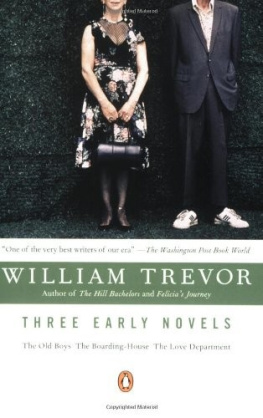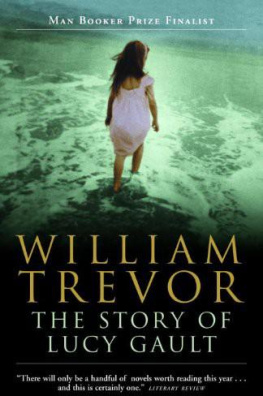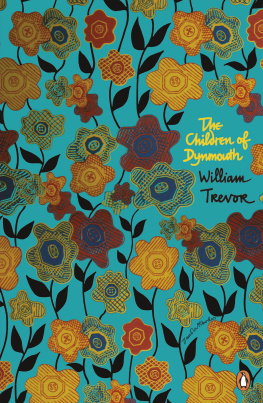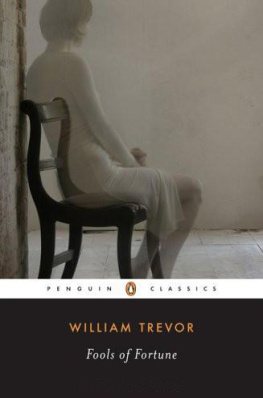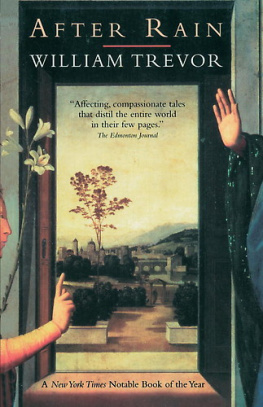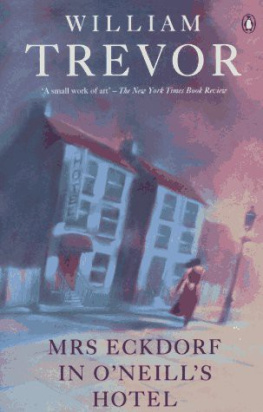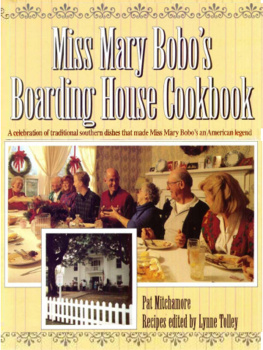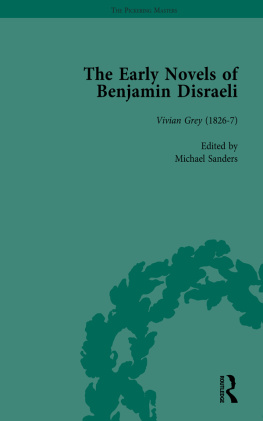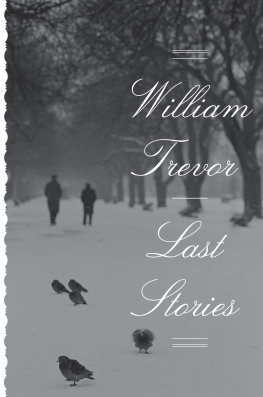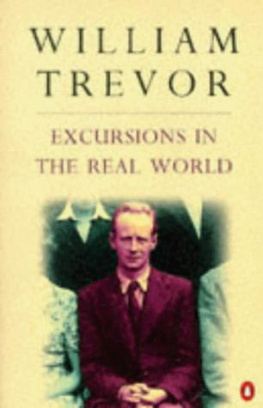NOVELS
The Old Boys /The Boarding-House /The Love Department /Mrs Eckdorf in ONeill's Hotel /Miss Gomez and the Brethren/ Elizabeth Alone/ The Children of Dynmouth/ Other Peoples Worlds /Fools of Fortune/ The Silence in the Garden/ Felicias Journey/ Death in Summer
NOVELLAS
Nights at the Alexandra/ Two Lives
SHORT STORIES
The Day We Got Drunk on Cake/ The Ballroom of Romance/ Angels at the Ritz/ Lovers of Their Time/ Beyond the Pale/ The News from Ireland/ Family Sins/ The Collected Stories/ After Rain/ The Hill Bachelors
PLAY
Scenes from an Album
NON-FICTION
A Writers Ireland
FOR CHILDREN
Juliets Story

This volume first published in Penguin Books (U.S.A.) 2000
The Old Boys first published in Great Britain by The Bodley Head 1964 First published in the United States of America by The Viking Press 1964 Published in Penguin Books (U.K.) 1966 Published in Penguin Books (U.S.A.) 1996 Copyright William Trevor, 1964 Copyright renewed William Trevor, 1992 All rights reserved
The Boarding House first published in Great Britain by The Bodley Head 1965 First published in the United States of America by The Viking Press 1965 Published in Penguin Books (U.K.) 1968 Published in Penguin Books (U.S.A.) 1995 Copyright William Trevor, 1965 Copyright renewed William Trevor, 1993 All rights reserved
The Love Department first published in Great Britain by The Bodley Head 1966 First published in the United States of America by The Viking Press 1967 Published in Penguin Books (U.K.) 1970 Published in Penguin Books (U.S.A.) 1996 Copyright William Trevor, 1966 Copyright renewed William Trevor, 1994 All rights reserved
THE BOARDING HOUSE
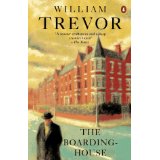
1
'I am dying, said William Wagner Bird on the night of August 13th, turning his face towards the wall for privacy, sighing at the little bunches of forget-me-not on the wallpaper. He felt his body a burden in the bed, a thing he did not know. His feet seemed far away, and it came to him abruptly that he was aware of his feet in an intellectual way only. It passed through Mr Bird's mind then that physical communication with his nether half was forever gone.
I am going out feet first,' said Mr Bird, a wit to the end. My legs have entered their eternal rest. Nurse Clock, I would have you record all this and pass it on to a daily newspaper. Nurse Clock, have you pen and paper?'
The nurse, seated some distance away, reading a magazine, read the message on the printed page: Bingo and whist drives below stairs at Balmoral. I am writing out your every word,' she said.
Then listen to this,' said William Wagner Bird, and did not ever finish the sentence.
Oh, God in heaven,' murmured Nurse Clock, feeling the presence of death and feeling thus that the invocation was proper. Only at Balmoral do they share a room, she read; and rose with that thought in her mind and covered the face of a man she had known for many a year and had disliked both in sickness and health.
The gloom gathered in the room as Nurse Clock set about her tasks and saw to it that certain decencies were observed. She did not glance again at the stretched figure on the bed, but worked briskly in her matter-of-fact way, packing away her personal belongings in her nurse's bag and tidying those of her late patient. The time was nine o'clock. I have been on the go,' said Nurse Clock aloud.
So it was that William Wagner Bird, a man of sixty-seven who had never married, died in the boarding-house on August 13th. Later his passing was recorded in a formal way only, by relevant authorities; for like others in the boarding-house, Mr Bird had had neither family nor personal ties. His parents had died five years back, in the same month, and had between them left him debts amounting to ninety pounds. He in his earlier lifetime had been in the travel business, a salesman of tickets to faraway places.
*
The boarding-house was an imposing building that suggested the reign of Victoria but which had been in fact erected at a later date. It stood at the corner of Jubilee Road, SW17, a turreted confection in red brick, with untended gardens at the front and rear.
When little Miss Clerricot had first stood upon the front steps, her gloved hand on the bell-pull, she had wondered as she waited for the sound of footsteps if she were not making a mistake. Nor did the fi gure that eventually appeared in' the doorway reassure her. She entered the dimness of the hall and was left there alone. The silence of the house was like that of a convent, and in a moment she walked through the silence, following the person who had opened the door, into the presence of the proprietor. And immediately the person who had opened the door, a Dickensian ancient, had been severely upbraided for presenting so slovenly an appearance and was in fact, in Miss Clerricots presence, dismissed from service. But Miss Clerricot herself had accepted the room she was offered, and came to like the boarding-house.
A brown wallpaper covered the wall by the staircase. The pattern it bore was one of large oval leaves that once had been depicted in a more subtle variety of shades: purples and dark greens, reds and russets. It was a late-night habit of Mr Studdy's to lift one of the three Watts reproductions and display for his personal pleasure the pristine glory of this wallpaper, and to make to himself the point about the effect of light on cheaply reproduced colour. A scandal,' opined Mr Studdy more than once, nodding sagely.
Throughout the house there were curtains and hangings and other wallpapers that matched the rich gravy shade of the paper on the stairway. Even the rubber plant in the hall had a tinge of it; and in the various areas of paintwork, the embossed borders that accompanied the paper up the stairs, the banisters and the painted portions of floors, it was ubiquitous. It appeared again, a colour wrought by time and wear, as a background shade in carpets and an overall tone in linoleum. In the three lavatories, one to each floor, it came into its own to such an extent that residents new to the boarding-house had been known to find it oppressive.
The brown of the boarding-house did not, however, universally command. Its effect was lightened by such touches as the three Watts reproductions, by several flights of china geese and by a series of silk embroideries worked in virulent colours that were spread over the backs of arm-chairs, ostensibly to catch the markings from the heads of Mr Studdy and others but really to cheer the rooms up. At Christmas, paper decorations were strung from picture rail to picture rail, imitation holly garnished the lantern-shaped light-fitting in the hall, and clumps of mistletoe were attached by drawing-pin to the centre of door-frames and were referred to often by Mr Studdy, especially in the presence of Miss Clerricot or Rose Cave. Mr Studdy had made an art of innuendo, just as Major Eele had made one of dumb insolence.
On the night of August 13th, Nurse Clock descended the stairs from the room where William Bird lay dead upon a bed. She carried in her hand her nurse's bag and beneath her arm, open at the relevant page, the magazine that contained the royal article. She was a woman of uniform proportions, stout about the legs and waist, though small in stature. She remembered as a child her mother claiming that she, Nurse Clock, had beautiful hair, and often, when much younger, she had examined the hair in a looking-glass and had discovered the quality her mother had been taken with: a foaming quality that was a kind of curliness. But nowadays Nurse Clock was more given over to other matters. Nowadays she rarely paused before a looking-glass to establish for herself the beauty of her hair.

